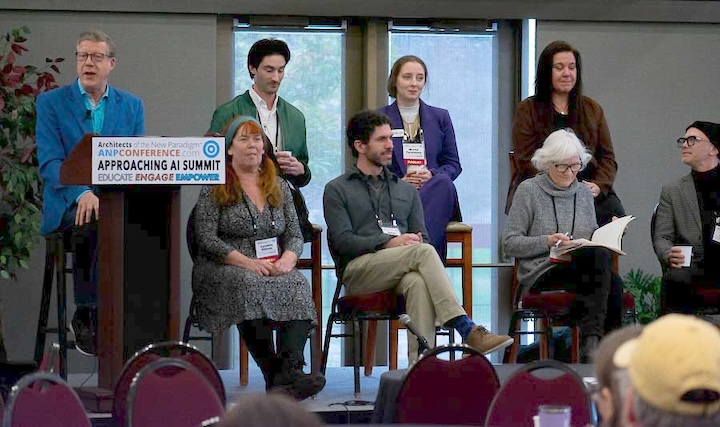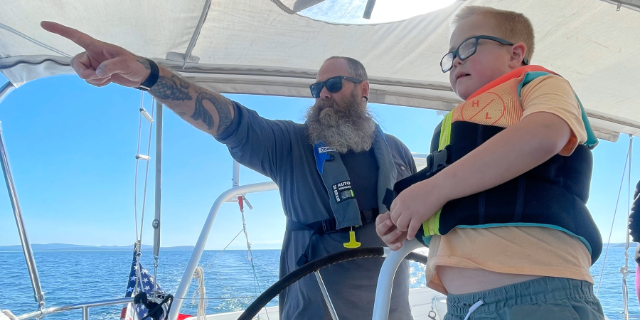AI Summit in Ashland wrestles with the genie in a bottle
Published 1:02 pm Wednesday, March 26, 2025


‘It is the steering we are concerned about’: AI impact expected to be huge — hopefully for the good
An artificial intelligence summit at Southern Oregon University Friday and Saturday sparked much debate about the rapidly evolving technology’s promise and pitfalls.
“It is evolving at a rate that the entire industry can’t keep up with,” said Paul Hynek, event emcee and professor of finance and crypto at Pepperdine University. “AI is a tool, and possibly one of the most powerful tools.”
The second annual Approaching AI Summit at Meese Auditorium and Stevenson Union on the SOU campus drew a larger crowd this year, with 250 in attendance.
Many sponsors and supporters were involved in the event, such as the Rogue Valley Metaphysical Library, Ashland Chamber of Commerce, Southern Oregon Regional Economic Development Inc., ScienceWorks, Southern Oregon PBS, SOU and others.
On Saturday, the summit reflected more concern this year about the direction of AI as tech titans and governments around the world accelerate efforts to perfect the technology, investing billions of dollars in data centers to support it. Microsoft has indicated it wants to reopen the Three Mile Island nuclear plant in Pennsylvania to power a data center.
Rep. Pam Marsh, D-Ashland, said very few Oregon legislators understand the technology, but she said her experience with Facebook, which she described as evil though she uses it to communicate with constituents, as well as the many downsides of social media, don’t give her much encouragement for the future.
“I’m not particularly optimistic that human beings are capable of monitoring those systems,” she said. “I think we’re in a tough place right now.”
Marsh, who was on the Living with AI panel, said she’s not sure if government will put safeguards on the technology in time.
“Do I have a high degree of confidence that regulatory agencies can regulate AI? I don’t,” she said.
Some of the presenters took a more optimistic approach.
Thor Muller, a best-selling author who started AI Lab in Southern Oregon, said there are many possible futures that might happen as a result of AI.
Science fiction novels have described some of these futures, he said, including the possibility that advanced AI and humans could part ways at some point, or the possibility that AI could create multiple super intelligences.
He said it’s up to us to determine what kind of technology we want and what to do with it.
“We don’t want to outsource ethics,” he said.
He said online participation has become a type of “surveillance capitalism,” noting many websites ask users to enable or disable “cookies” to keep track of their clicks.
“There are a lot of challenges to enact controls that protect ourselves,” he said.
He said he envisions a future where a bespoke AI could be located on a particular device and would be able to negotiate for a variety of services on behalf of the user.
Theige Thorsen, an AI ethics advocate and media innovator, said, “AI is happening right now. It is helping us right now, it is hurting us right now.”
While she disagreed with Muller on some points, she did say she thinks people shouldn’t outsource ethics to AI.
“I’ll agree with ‘Loki’ (Muller) here,” she said. Loki, the god of mischief, is a villain in the Avengers movie.
Thorsen said those who participate in the AI world are expected to hand over a certain amount of data.
“Data is a kind of currency,” she said.
Many of the presenters compared the power of AI technology to the Wright brothers and their sister’s development of early aviation.
The Wright family thought aviation would end warfare because planes would be able to survey the entire battlefield. The Wrights didn’t foresee bombs being dropped from airplanes.
Hynek said earlier aviation attempts pre-dated the Wright family, but the Wrights figured out the critical steering mechanism that was essential to flying.
Likewise with AI, Hynek said, “It is the steering we are concerned about.”
He said online diagnostic tools will revolutionize access to health care.
At the same time, people will be divulging much of their health data into AI.
“Do I care that I have given an unprecedented amount of HIPPA (health information) into AI that will hurt me in the future?” he questioned.
He said that for most people it’s easy to hand over the information because they are looking for answers quickly.
“How do we get past the apathy and get past the corruptors,” he said.
Muller said bombs were being dropped from balloons long before the first plane flew at Kitty Hawk, so the Wright family could easily have foreseen that possibility.
Marsh said other earlier attempts at flight funded by government proved unsuccessful, until the persistence of the Wright family.
After that point, “The government drove the technology,” Marsh said, noting that the government poured money into private companies that perfected aviation during the first and second World Wars.
She said state governments, including in Oregon, have shown some interest in AI guardrails, noting that there are some 450 bills being debated across the country.
“The states are trying to get their arms around this,” Marsh said. “I’m not so sure about the federal government.”
She said she’s concerned about many of the features of AI, such as “deepfakes,” or images and videos that appear to be real, including sexually explicit images.
Marsh said social media and AI are already distorting political campaigns.
Sen. Jeff Golden, D-Ashland, said he represents about 150,000 Oregonians in his Senate district.
“District 3 probably has the most fragmented views on the issues of any district in Oregon,” he said.
He said he would like to have better tools to better gauge the views of his constituents.
“Could AI take on the complex task of dealing with that?” he wondered aloud.
Hynek said that in the 1980s when personal computers arrived, “we were told that we were entering an age of leisure. Will AI give us more leisure or more work?”
In response to Hynek, Heather Stafford, CEO of Rogue Workforce Partnership, quipped, “We are working on a Saturday.”
Reach freelance writer Damian Mann at dmannnews@gmail.com.









